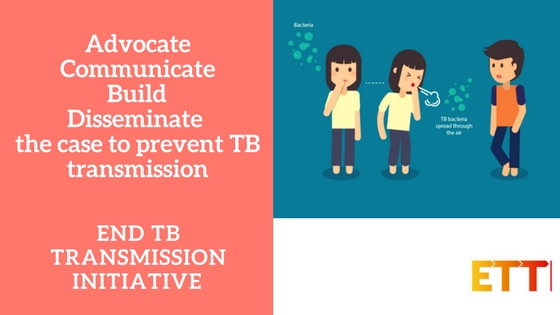The Goal of the ETTi Working Group
In line with our mission, we intend to promote effective airborne IPC by:

- Advocating for airborne IPC as a worldwide priority and achieve those goals by collaborating with TB and airborne IPC partners, NTPs, academia, donors/funding agencies, civil society, and other stakeholders.
- Advocating for increasing financial investments in TB research and innovation in airborne IPC.
- Building global capacity for airborne pandemic preparedness (SARS-CoV-2 and beyond).
- Helping to build and disseminate the evidence base supporting best airborne transmission control practices with an emphasis on TB and COVID-19 and tracking worldwide implementation.
- Helping professionals develop, implement, and evaluate best practices through research and dissemination of results.
- Engaging civil society in supporting a global movement to prevent airborne transmission of the disease everywhere.
- Promoting and improving approaches to data sharing to advance scientific discovery and dissemination of findings, reducing duplication of efforts, and facilitating the translation of evidence to national and global policies on airborne IPC.
The 2022–2027 Strategic Priorities are the following:
Priority 1: To advocate and communicate for preventing airborne transmission as a strategic priority worldwide with emphasis on ending the transmission of M. tuberculosis and reducing the transmission of coronaviruses, influenza viruses, measles virus, and other airborne pathogens.
Priority 2: To advocate and communicate need to foster an inter-sectoral approach to incorporate innovative technologies and their rapid uptake for preventing airborne transmission of TB, SARS-CoV-2, and other airborne spread microorganisms.
Priority 3: To encourage and promote research capacity building on ending the transmission of M. tuberculosis and reducing the transmission of coronaviruses, influenza viruses, measles virus, and other airborne pathogens within the health care system, considering fostering this research in undergraduate courses and graduate courses (master’s and doctoral programs).
Priority 4: To assist in disseminating the scientific evidence base for implementing conventional and novel airborne IPC interventions.
Priority 5: To promote improvement in airborne IPC at global, national, and local levels through:
- Advocacy
- Leadership
- Capacity building
- Training and Education
- Health system strengthening
- Monitoring and evaluation of interventions


